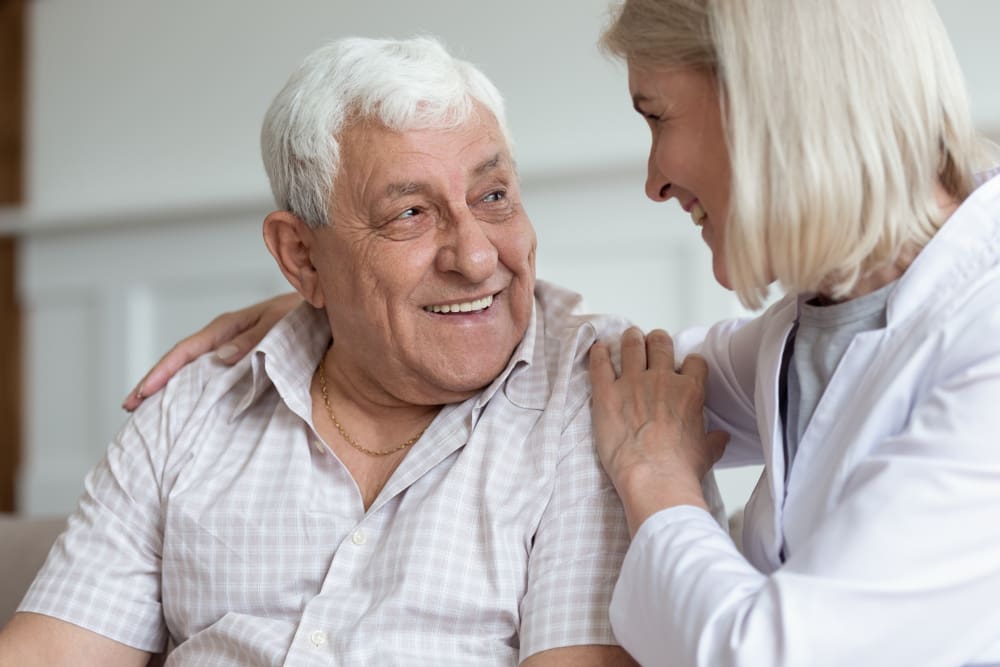Trained as a licensed practical nurse in 1948, after being a nurse’s aide in Rochester, New York during World War II, Rita Hirschler has cared for the sick and dying throughout much of her century-long life. She has provided end-of-life care for multiple family members, including her mother, two husbands, a daughter, my mother, and many patients. I might not be alive to write this story had my grandmother not been by my bedside 33 years earlier in the hospital’s intensive care unit and noticed I was bleeding internally.
On January 8, 2018, Rita turned 101. She has spent the last 840 days in this nursing home, enduring a tiny, shared space separated by a thin curtain and the maddening blare of strangers’ television selections. When I visited her two days before Christmas 2017, I asked her how she was doing. A single tear formed, desperate, as if tortured, her voice quivered, “I can’t sleep!” Meanwhile, her roommate screamed gibberish. The woman’s daughter, cognizant of the disturbance, reassured my cousin, “She won’t be here long.” Making light of the mortal implication, my cousin quipped, “They’ll do a Dateline special on my grandmother soon—this will be her third roommate in the past year.” The woman died Christmas day.
As chair of the department of health and physical education at Monmouth University within the Marjorie K. Unterberg School of Nursing and Health Studies, I enjoy working in a vibrant environment where we prepare the next generation for personal and professional success. Living on the beach 2 miles from campus is a nice mood elevator as well. So, the few times each year that I drive the 6 hours to see my grandmother, I’m especially sensitive to the contrast in how I feel in the nursing home. Despite brief visits and what I consider to be a relatively deep reserve of emotional well-being, when I sign out, it’s a struggle to remain positive. Smiles belie the pain and loss. How can she take it? How can anyone? Does grandma have unique insights as a resident after spending decades on the other side of the care equation?
At 97 years of age, Grandma was still stubbornly climbing the cellar stairs to launder clothes, reassuring, “I take my time. I say a Hail Mary on the way down and an Our Father on the way up.” Towards the end of her 98th year she continued to cook, clean, and grocery shop. However, her life was about to change.
My dad called me at work to inform me that grandma was minutes from getting an angiogram. I questioned why. Of course, they will find something; she’s nearly 99. I resisted the urge to demand a delay. I reasoned, she’s under a doctor’s care—who am I to question this decision? It’s unlikely my request would have been honored, but everyone needs an advocate.
During the exam she went into cardiac arrest, and her heart was shocked back to life. Days later she was given a choice: Get a pacemaker or die.
After a brief stint in a rehab facility, Gram was back to enjoying the comforts of home, the energy of grandchildren, Sunday dinners with my dad, and a neighbor who would bring homegrown tomatoes. With the aid of electrical impulses keeping her heart’s rhythm, my grandmother joked about the intentions of her 80-year old neighbor and pondered whether she should have chosen life. A few weeks later, after pressure from the doctor who ordered the test, the office of the aging, and family members who felt the time had come, grandma was placed in a nursing home. Although she had experience with short stays, this was to be permanent.
Having failed to protect her against what I believed to be an unnecessary exam, I protested vociferously against the nursing home solution. Grandma had earned the right to die at home. At 99, her life expectancy was just 2 ½ years. Surely our family could help fund her final days. Wouldn’t selling her belongings be devastating?
But practical matters prevailed. If visiting nursing care ate up what little remained of her liquid assets her options would dwindle, and she might not be able to get into this relatively nice nursing home. It wasn’t like my grandma to go without a fight, but the cardiac event had taken a toll. “What are you going to do? Your hands are tied,” she said. “What I should have done is gone to the canal and dumped myself over.”
One month after entering the nursing home, nearly every one of grandma’s possessions had been sold. A century’s worth of life—a couch that 50-year old grandchildren slept like babes on, plates my grandfather last used 30 years ago, and the sights, sounds, and smells that were irreducibly grandma’s home—was liquidated, as sure as hope.
A couple of months passed before I could bring myself to call. “Grandma, it’s Chris.” Seemingly waiting for this moment, Gram blurted, “Did you see what my family did to me?” I explained, but Gram argued, “Best interest? This isn’t in my best interest! If I was home I could have prepared a proper breakfast.” Months later, Grandma was still dissatisfied. She went on to describe an exchange with a dining room staff member. Grandma said, “I’d like a cup of hot coffee, please.” The staff member replied, “I just gave you a cup of coffee.” Grandma lamented, “You drink it cold or you go without.”
Had her professional nursing home experience prepared her to be a resident? Grandma said, “It helped me, but it also made me very upset because there’s a lot of things here that should be changed, I’ll tell you that much.” Although “sometimes you get a nice aide and they come as soon as the button goes off outside your door”, she often waits 20 minutes or more. “I’m afraid of falling even though I’m hanging on to something. Like this morning, I knew I had to go to the foot doctor. So, I rang my buzzer for an aide to come and help me get up, and I was tired and my shoulder hurt, but no one came. So, I get up. If I fall, I fall. I don’t give a damn!”
Still, I observed that she seemed to be making the most of it—making friends, playing bingo, and being involved. “What choice do I have?” she replied.
Our conversation turned to nursing. “I never stopped working. If someone needed a nurse, I would go and take care of them. I always kept my license up.”
On her approach to patient care, she said, “I was always good to people. If I had to go out of my way to help them, I would do it. It didn’t cost me any money to be kind and gentle and say a kind word, or say ‘you’re going to feel better tomorrow’ or ‘I’ll say a prayer for you tonight; you say one for me’, and their face would light up.”
Nurses “always have to look for something to do” and empathize with patients. It’s something she still practices. Recently, she asked a fellow resident, “Why are you so nasty?” “Well, they treat me nasty,” the resident said. So, Gram spoke with the two caregivers and learned they were treating the resident that way “because she doesn’t like us.” She urged them to imagine the woman’s plight and secured a meeting at the end of their shift. “We met out in the dining room. Have I got you any closer to treating people nice like you want to be treated? And she said ‘yes’, and she cried. ‘We want to thank you.’ And I cried too. And I put my arm around them to let them know I appreciated they understood that a patient is a patient. She needs help, she’s in pain, she’s away from home, she doesn’t have any family. How would you like to be in that condition?”
Each year 1.4 million residents find themselves in a similar condition in one of the nearly 16,000 nursing homes located throughout the United States. Even when family members and healthcare professionals have the best intentions, the sad reality is that no one really wants to be in a nursing home.
Just as there are reasons to stay clear of hospitals, such as hospital acquired infections and mistakes, nursing home care carries certain risks that living at home does not. As I type, the nursing home is encouraging visitors to not visit while they attempt to get a flu outbreak under control. In addition to the risk of infectious diseases in an institutional setting, the detrimental impact of the environment on mental health can be life-threatening. Witnessing the ill, infirm, and demented en masse can cause one to be blue. When the bell tolls as often as it does in nursing homes, it is understandable that one might ruminate on when it will toll for them.
Certainly, end-of-life care provided in nursing homes is often necessary, and the people who provide high quality, loving care are to be commended, as are the family members who are doing what they believe is best for their loved one. However, we need to make it easier for people like my grandmother to receive in-home care. Living at home is worth a lot. For many, it’s worth the risk that they might die because of this decision. While there is no guarantee that living in a nursing home will prevent a fall or a host of maladies, the experience of loss and subsequent depression are often predictable eventualities for those relegated to permanent institutional care. Even if a nursing home promised additional quantity of life, is it worth it? For many, like my grandmother, the answer would be no. They want to live and die in their home.
Chris Hirschler is chair and associate professor, department of health and physical education at Monmouth University in West Long Branch, New Jersey.



















15 Comments.
I am not a nurse; I work in dining services at what I consider to be a very nice nursing home. However, I have noticed that many of the other food service workers do not treat the residents like people, often referring to certain patients as “not all there” or using similar phrases to describe them. Another thing I’ve noticed is the way residents are treated; more like a number on a ticket than a real, living, breathing human being.
When Jesus met people in the streets of Palestine, He treated them with kindness, mercy, and compassion. He did whatever He could to help them, even touching a person with leprosy, a disease that was, at the time, considered the absolute WORST of all infectious diseases.
I sincerely believe that if people treated these patients with the compassion and kindness that Jesus showed, then nursing homes would have an entirely different reputation. I really do. To be honest, the whole world would be different if all people were treated that way.
I have worked at 8 different nursing homes in a span of 4 years as a LVN, thinking I would eventually find a place that wouldn’t assign 30 patients to me in a shift. Alas, no such place exists. The solution is to stop having corporations own nursing homes. They shouldn’t be able to make money off of sick and old people being treated like cattle. They should stop paying administrators and DONs 100k plus a year while the floor is dangerously staffed. And the annual survey is a joke. The admin knows when surveyors are coming and we suddenly have so much help for those days. But once the surveyors leave, it’s back to reality again. I now hate my job and am finding a way to leave healthcare. The lies are numerous. It’s a farce.
I am a 70 year old woman with schizo affective and bipolar 1 disorders can well as problem with balance and mobility which developers 10 months after losing my sister with whom I livedcfor c 30 years. AaBut I also v. write portray and troubleshoot android tablets. I have a keen interest by con world affaire. Particularly what is happening VN in. the middle east.
I don’t want to spend the rest of my life by smelling other peoples bowel movement s, playing bingo. ,or eating on a bedside trray. As for falling, I know someone who fell in a nursing home and broke her hip. Someone else I knew died shortly after admission too a nursing. from a broken heart and loss of dignity. A nursing home is the last stop before the grave. If seniors could get free home care and housekeeping by most of them could remain in their own homes. But today everyone worships the almighty dollar. There is no love or sense of moral obligation anymore
Great article thank you for sharing…My mom is in a nursing ho.me I visit everyday anytime so with that said Mom is taken care of…But I see the difference when you dont visit…I am my moms voice…Unfortunately we can all expect to have a voice some people are just left there …its a sad situation.
Many valid points offered. Yes there is a necessity to nursing homes. Yes in home service shouldn’t be such a difficult sought alternative. As a nurse with yrs exposure I would currently least trust corporate owned and managed nursing homes. They are in the business of exploiting debilitated for profit and most anxious to cut overhead and labor costs. Caring for your loved one in a nursing home has everything to do with labor. The jobs are horrific and low paid. Residents can be non-compliant, violent completely dependent and physically difficult to lift and care for. The staff are under pressure to care for many at once. Turn over is high. Complaining about hands on care is generally not helpful. Continually present picture taking judgemental family are not helpful. Care providing and institutions available need to be assessed realistically. Stop being so quick to blame
This is a great article, but spending 6-12 hours or more per day for almost 2 1/2 years i witnessed residents who did not have an advocate mistreated and neglected by aides as well as the nurses. You can’t be sitting up at the nurses station sharing cell phone videos and shopping online or doing your animal rescue duties, while staff are not feeding residents, do not have their call lights, going without proper wound care by not putting prescription medicine on the ulcer but 2″ away from the ulcer, missing prescriped wound dressings etc. One good nurse out of 14 is not good odds. Two good aides out of 40 is not good odds. I watched as new untrained, unoriented aides transferred the flu from one room to another, even during mandatory quarantines. New aides not being told they need to hand feed a resident, meds found on floor, in bed, stuck on residents skin etc and the facility blames the family! Instead of fixing the problem. I witnessed fall after fall because there is not enough staff to sipervise vulnetable residents. A facility not listening to a witness about a residents declining condition and giving said ill dehydrated resident who had a temperature bowel prep for a colonoscopy causing resident to be even more dehydrated causing resident to become unresponsive only for the hospital to say the resident had the flu as well as pneumonia, how coukd a daily visitor see the symptoms of respiratory distress and not actual nurses? Why werent the aides reporying yhe change in condition. Why arent witnesses reported concerns being documented. I can tell you why, because then they would be found guilty of neglect. I kept very detailed notes, dates, times, staff names, witnesses etc and people still are allowed to be abused and neglected in nursing homes. I would rather fall and die at home from said fall then be forced into a facility by the state who says i needed a higher level of care and that higher level of care is staff forgeting to feed me, my call light routinely being left out of my reach, 3″ ulcers to the bone, staff charting cares are being done when they are not and b er ing srxu a’s lky anused by male staff….and yes at least three complaints of sex abuse against the same aide. Nope, no way. I will stay in my home even if i die a year earlier than expected. That should be my right.
Your article proposes a fair point, but as a registered nurse in an acute care hospital, I see the necessity of nursing homes. It is unfortunate that they have to exist. But I often see a pattern with elderly patients that live home alone or with children. As their mobility declines and chronic conditions continue to get worse, they have repeated falls with injury, can no longer cook/clean/bathe themselves or take medication. Home health can help to an extent, but they only come once a day at most. Live in aids are extremely expensive and not an option for low income seniors (medicare doesn’t pay). Adult children are too busy with work and their own families. I agree that nursing homes are often sad, desolate places (as are hospitals) but the injuries that I have seen patients sustain from falls at home, untreated UTIs and pneumonia and more are equally depressing. Most times we try everything possible to keep a patient out of a nursing home, but sometimes there are no other safe and reasonable options. Also keep in mind nurses and nursing aids in skilled nursing facilities can have up to 30 patients per nurse in their care. It’s not safe and many things slip through the cracks, but the nurses themselves are not responsible for those ratios. Safe nurse to patient ratios are a problem throughout the country, so it is important to keep that in mind when a nurse doesn’t answer a call light within a few minutes.
Sorry for the loss of your Gram, I feel the same way about nursing homes and had to fight siblings to give my mom the right to pass away in her home.
She was totally against nursing homes and took care of both her parents in her home until they passed away. She deserved to have her wishes obeyed.
Thank you for sharing this story!
Sara Beth, Thank you. Actually, Gram turned 104 last month. The past year she has declined considerably, but she still knows family members and engages in brief conversations.
Great article Chris! We found a solution for 99 year old Nana. Instead of an assisted living she has a Live-in aid. the cost is probably cheaper than what the assisted living was going to charge her and she is so happy to stay in her own home.
What happens when the live-in aid has a day off or needs to go in a trip? Genuinely curious as I’m considering the same option for my mom.
great article & so true.
I totally agree. I am a LPN for 36 years, I have cared for the elderly for most of these years. It use to be mostly dementia residents but now we care for alcoholics drug addicts and psychotic people who attack staff as well as other residents. I would never put my love ones in a place like this, and would do home health to keep them in their own home or with me. I continue to work in this environment because the elderly need love and care and protection and when they smile and hold my hand, I know this is where GOD wanted me.
Great article Chris! Thank you for sharing… we owe our seniors so much more.
Well written. What is the solution?